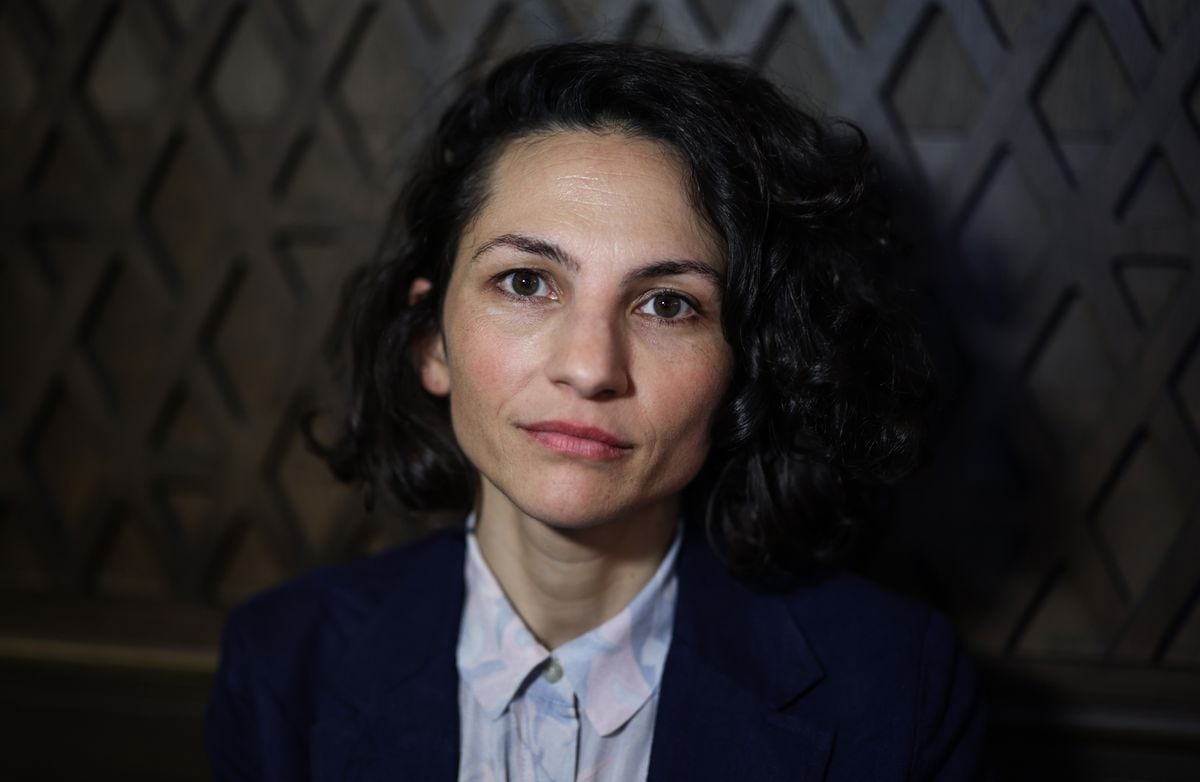Filmmaker Manuela Martelli at the BFI London Film Festival on October 7. Tim P. Whitby (Getty Images for BFI)
Manuela Martelli (Santiago, 39 years old) started in the world of acting in 2003 with the purpose of one day directing a movie.
After participating in 18 productions (
B-Happy, Machuca, Il Futuro
), the actress debuted as a director and screenwriter for the feature film
1976
.
The film premiered at Cannes has made a praised tour of the international film festival circuit that culminates this Thursday with its premiere at the Valdivia Film Festival, 850 kilometers south of the Chilean capital, before reaching commercial theaters.
The bet of the South American country in the race for the nomination for Best Ibero-American Film at the Goya Awards tells the story of a sensitive bourgeois woman trapped in conservative canons during the first years of the Pinochet dictatorship.
Martelli worked for almost a decade on the project that seeks to understand how one could live ignoring the horror of what was happening in the streets and if it was possible that there were people who were not affected by it.
The initial driving force was her grandmother, who died in 1976. “It struck me that when my grandmother's depression was discussed, it was read as an individual experience, a state that seemed part of her identity and not a contextual phenomenon linked to politics. and the social”, explains this Wednesday the director in the cafeteria of a hotel in the southern city.
Ask.
She got into the world of acting thinking about directing 20 years ago.
Now that she's made her first feature film, has it been what she expected?
Response.
There was a gradual process so it was not very strange.
I had experienced it as an actress observing different directors and later I directed two shorts, but I really liked the possibility of understanding the film as one shoots.
I was also very surprised by the reception it has had.
Everything went so against all odds... Each thing was a battle so there was no time to think about anything other than the present.
We learned about the Cannes selection when the film had not yet finished post-production.
It was a very accelerated process to be able to release it.
We were going to shoot just before the pandemic, we had to wait a year and shoot with all the restrictions.
I didn't have a minute to project anything, I just solved the day to day, that's why I didn't wait for the answer.
Q.
It was an Argentine co-production.
How important are these synergies in Latin American cinema for small industries to develop?
R.
It is a complex question because it has many edges.
It seems to me that there is little collaboration between Latin American countries.
Now a little more with Brazil, with Argentina, but there are still countries that have very few production funds and very little is distributed within the region.
It's a long way off, but it's very rewarding when it happens.
The film is called
1976
, which for Argentina is a very important date.
Being able to discuss the film with that contextual perspective was very positive.
To be able to observe it with those distances and those similarities.
Argentina has a much more consolidated film industry.
I learned a lot when we went to film there.
They are very professional.
The Chilean industry is precarious, but well known in the international festival circuits.
P.
I used to say that what there was in Chile was not a film industry.
Now there is?
R.
There is an incipient industry, but I think that a large part of that industry is sustained by the self-financing of the subjects that make it up.
There is much that one does that is not considered work.
One finances that will to do, but that is not recognized by the State.
It seems to me that there is something unstrategic in not seeing the value that this has, both in terms of industry and the cultural value that it means.
There is a huge responsibility there for how capital is distributed and what value is given to culture in the spaces where capital is concentrated in Chile.
Q.
Who can make movies in Chile?
R. The cinema is still a very elitist space.
I speak of justice with the stories when I say that it seems necessary to show the perspective of a woman in a Chilean historical era that has already been reviewed from the male perspective, but the class debt that exists is enormous.
It is very complex because these stories can only be told by the margins, but there is a giant paradox because of the access that one has.
The capital that I have for having studied in an elite school, how I can handle myself... There is the tremendous debt.
How much we miss those stories from the margins.
The stories of women of those years were marginalized from the histories, but also those of the working classes... The stories of poverty exist until now from the point of view of the privileged classes,
and no one knows what it is if they did not experience it firsthand.
I don't know how to tell you.
Those stories are not.
Q.
Has the industry changed since you started as an actress?
A.
It has changed.
And there are also exceptions.
Not everything is black or white.
When I started acting, in 2001, 10 films were made per year in Chile, and 95% were by privileged male directors.
Few people could afford to make films in such a precarious environment.
That has changed and production has quadrupled.
In between, the Film Law was created, production funds have increased and been institutionalized, but very few people have access to them.
It is very competitive and there are not many other options.
Nor does the business class consider culture important enough to finance it.
For me, distribution is fundamental.
If one only puts the energy into production, but then the films are not seen, they lose meaning.
P.
Chilean cinema is recognized abroad, but the number of spectators is not high, why?
R.
Little is recognized, I think less and less.
We are very victims of the imbalance of resources.
People were left with an old idea that this cinema was made in a very precarious way.
It is difficult for them to value it because there is little access and few resources to make it known.
But it is not only the viewer's fault, but there is a very perverse system of resources.
There is also a culture that cinema is made for subjects involved in culture, as if it were a separate world.
We must point to the awareness that culture is a right not of the people who make it exist, but of everyone.
In countries where this is already part of society, they understand culture as their own right, especially national production.
P.
What is your next film about, set in the Chile of the 90s?
A.
I don't want to get too far ahead of myself because it's still in the incubator, but the quest is a continuation of
1976
.
To get into the margins of history, into those fissures that have leaked into the books, into the press.
In spaces that seemed not to be historical.
I like the idea of understanding films as steps, not as objects in themselves, but as a continuation of something that has no end in the credits.
There are questions that found an answer and others that did not, and those that were pending may be resolved in the next one.
Q.
Will a project be faster than the first?
R.
On the one hand, there is an anxiety to do.
I found it very entertaining to shoot, ride.
The creative process of writing is much more rippled, solitary, thankless.
The financing is also slow.
Competitive funds in Chile have a single application date, so you have to wait a whole year.
This means that many times the possibility of co-production is delayed because it depends on your own country supporting you.
However, if one knows how to take advantage of that wait, many things can be decided.
Movies are like these heavy ships that move slowly and need a lot of decanting.
There are others that are easier to do on the fly and lighter in terms of production.
Each movie has its own time.
With
1976
I cultivated patience.
Subscribe here
to the EL PAÍS América newsletter and receive all the key information on current affairs in the region.






/cloudfront-eu-central-1.images.arcpublishing.com/prisa/LMJGKBBBMRUMLZ75Z2RTYPWCPQ.jpg)
